In the competitive solar panel market, Trina Solar stands out as a brand synonymous with reliability and value. They’ve built a reputation on promises of quality and durability, making them a trusted choice for Aussie homeowners. However, a recent chat with a fellow installer reveals a stark reality that may leave you questioning their reputation; and us questioning their place on the SolarQuotes recommended panel chart.
Water And Electricity Never Mix
Water ingress is a common failure mode across various solar panel brands, not sparing even the pricier ones. Earth leakage faults often result from water seeping into panel edges.
When they’re manufactured, the cells, busbars, internal panel wiring are all encapsulated between sheets of EVA, (Ethylene-vinyl acetate) together with mylar film on the rear, and glass on the front. Using a good deal of pressure and heat, the process causes the EVA to crosslink, and this melding seals all the electrical components into a really durable package, mostly.
However, issues arise when panels are installed at very low angles, allowing water to accumulate and potentially cause damage. This underscores the importance of both proper installation and a solid warranty.
The Trina Warranty Gone Wrong
A recent warranty claim involved 14 x Trina Solar Panels (TSM-200DC01A 200 watt solar modules).
Trina approved the claim, but with a surprising twist – applying their “updated” warranty standards meant replacing just 1,568 watts for a system originally rated at 2,800 watts, a stark contrast to what one might expect from their 12/25-year warranty.
“ Dear customer, our warranty standard has updated. as modules are exceed product warranty, we will use remaining warranty to make solution. the remaining warranty period is 25-11=14 years. the total power we use to make the replacement is 2800*14/25= 1568W “
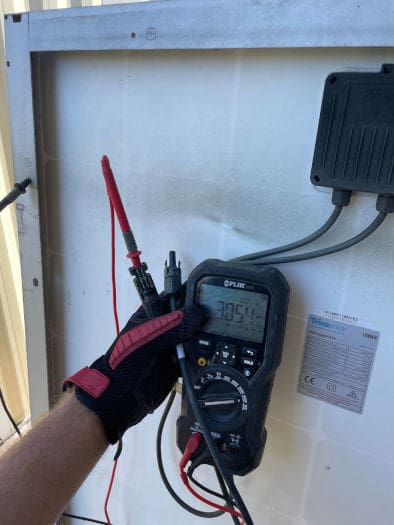
Low resistance to earth shows this one is toast.
Warranty vs. Reality
Trina Solar documentation section b) (i) offered a 12-year product warranty and a 25-year warranty on yield for these modules.
for P-type Mono PERC Products (as defined in Sec. 1) b) (i), (ii)): 2.5% in the first year; from the 2nd year
to the 25th year, the average annual power decline will be no more than 0.6%; by the end of the 25th year,
the actual power output will be no less than 83.1%
2800 ÷ 100 x 83.1 = 2327w or roughly 19 watts per year degradation. It seems promising until the warranty claim reveals a pro-rata nonsense is applied. Trina are a kilowatt short on their offer. At 11 years I’d expect 92% not 56%
A 10-year warranty to ensure panels won’t fall apart is pretty standard across the industry, but no coverage for water damage afterward, when there is supposed to be a guarantee for electrical yield? It’s a puzzling situation but the Australian Consumer Law (ACL) text is there in the document on page 10. In my opinion, they appear to be ignoring it.
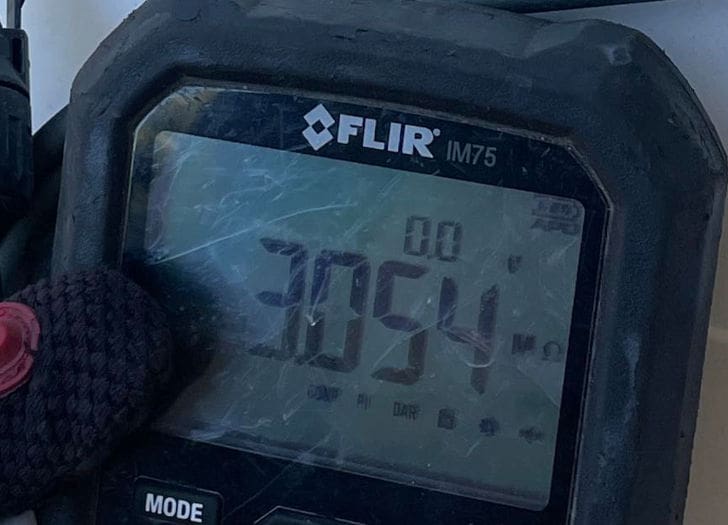
3 MΩ isn’t enough
The Compliance Conundrum
Trina Solar offered 6 replacement panels, larger, later model (but frankly vintage) 265 watt units with different electrical specifications obviously. This poses some practical problems which soon snowball into binning everything and starting again, because if the end user wants to replace the full 2.8kW array, there needs to be 1.21kW made up with a different type of panel.
- Two different panels types forces replacement of the existing single input inverter
- Even if you could find three 400w panels, the string voltage will likely be uncomfortably low
- Microinverters become an option
- In any case the whole system would require updating
Of course a complete update is going to be a good option, but if you choose this, and the installer is willing to exchange your warranty claim on a new array of latest specification solar, the question remains – what can they do with just 6 oddball panels? Hope for a hail storm and some other customers needing vintage 265w replacements? Not many businesses will be willing to warehouse their cashflow like that,
The best analogy I have for Trina’s warranty? It’s like being told :
“Your Toyota Landcruiser is dead, but as it only had 56% warranty left anyway, here, we’ll give you a Yaris.”
The Yaris might technically be new, but it’s an old model and even if you bought the towbar, you’re stuck with something that can’t tow your caravan.
There’s grime on the glass; but the corrosion on the busbar and the curved witness mark discolouration on the right won’t wipe off, that’s a panel full of moisture.
The Importance of Customer Relations
In contrast to Trina’s disappointing approach, the same contractor reports other brands are streets ahead.
Having the right people in the right places makes all the difference. Rather than bean counters, a good communicator with a technical understanding and a little generosity will generate more brand loyalty than all the advertising in the world. After all it’s the installer who’s actually making the sale in the vast bulk of cases.
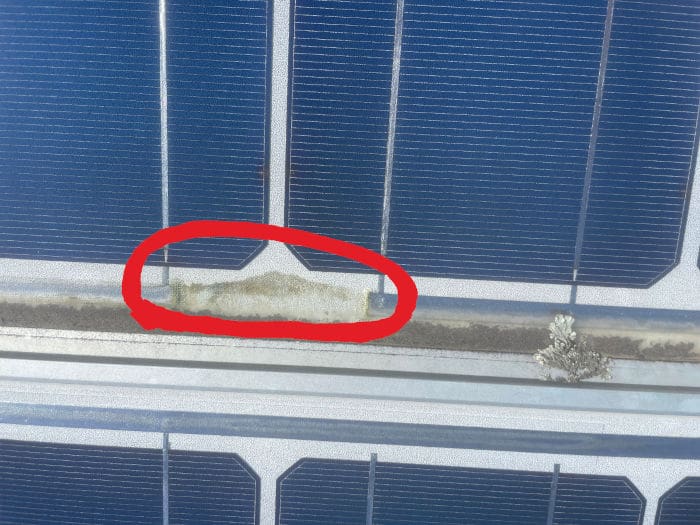
Many insulation failures aren’t visible but this one is obvious. Ignoring the brown dirt, the verdigris under the glass is a telltale.
Q.Cells For A Quality Response
By simply paying out 60 cents per watt on warranted failures and QCells offer flexibility in how they handle warranty claims, even allowing customers to choose between cash or new panels.
This offers the end user an option to replace an array with the latest technology, keep a legacy feed in tariff, or expand the system now that solar prices have fallen.
Q Cells approach underscores the significance of good customer relations in the solar industry, not just offering the customer a value proposition, but making life easier for the installer who has to make the technical compliance work.
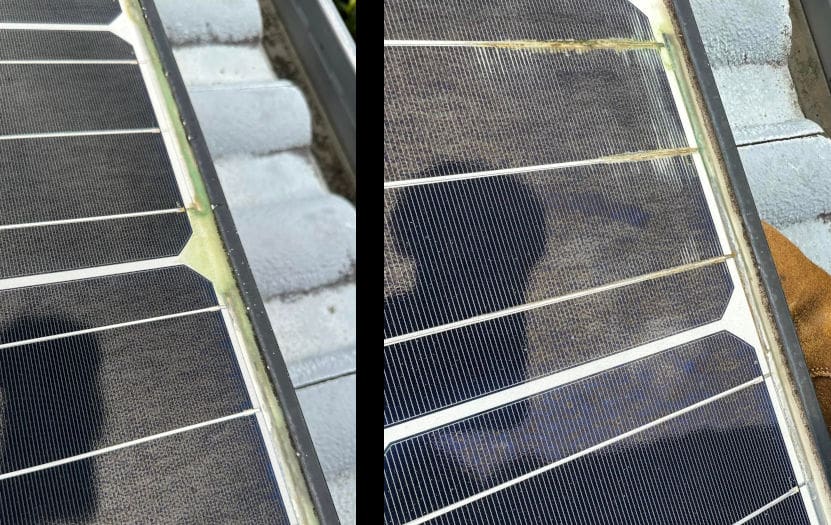
Even expensive LG panels have warranty problems sometimes.
Just Treatment From Jinko
Despite being some 2 years out of warranty, Jinko have honoured their commitment in a different fashion. In this instance the failed array was a 5kW name plate (20 x 250w) and they said look we can pay you out, or give you 6 kW of older stock 370w modules.
What was the upshot? 16 x 370watt modules for a bonus extra kilowatt of capacity installed. You can accept old stock on that basis, especially as smaller 370w panels, with thicker frames, are lovely to handle compared to the current crop of 440w monsters.
What Lies Ahead for Trina?
This report might leave some wondering about the future of this well regarded brand. If stories like these continue to emerge, Trina may find itself losing more than just its place on our recommended list.
This warranty ordeal serves as a stark reminder that while all manufacturers are liable to have a failure at some point, how these manufacturers live up to their promises is what matters. When choosing solar panels for your home, it’s essential to consider not only the brand but also their customer service reputation. Look at the reviews and search for the one star results, they’ll be illuminating.

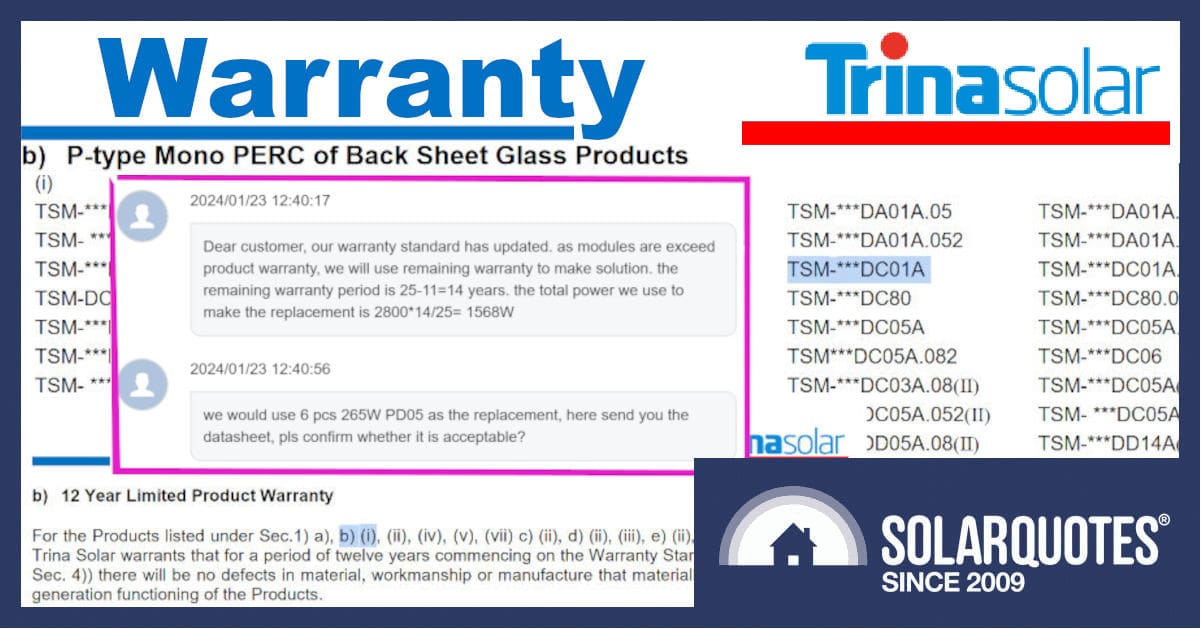
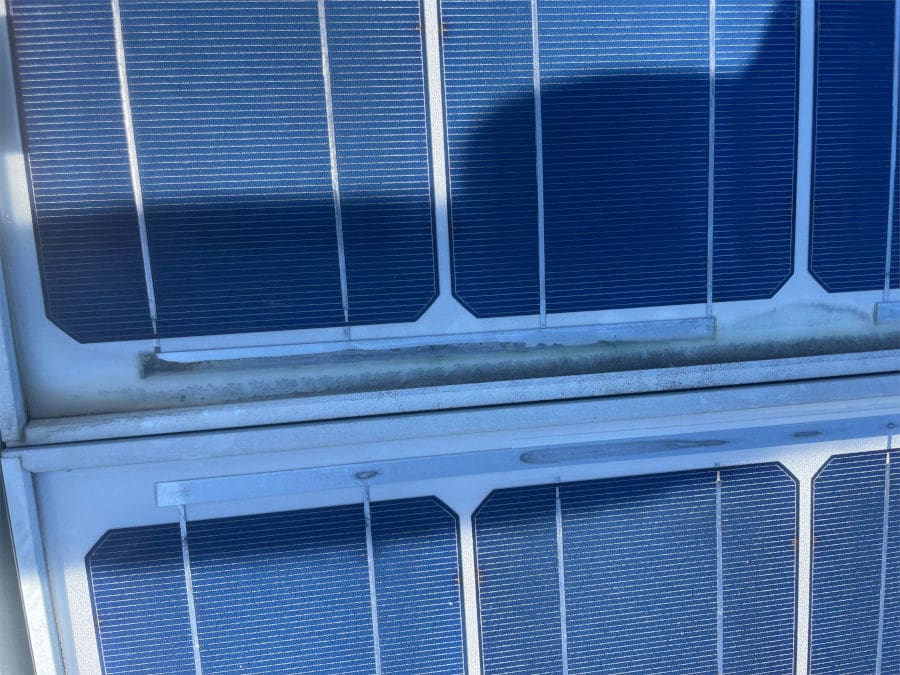
 RSS - Posts
RSS - Posts



And sadly for the installation company/retailer they will be held liable (if in NSW) by the new Building Commissioner.
I wonder how many people have the pro-rata nonsense in their warranties and don’t know it. I know it is in the fine print for my SolarEdge battery’s 10-year warranty. If it claps out in the 10th year, if SolarEdge so choose, they are only on the hook for 10% of a replacement battery.
Interesting, this could not be further from our experience with Trina when we have needed them.
One of the other named manufacturers in this blog was the complete opposite to how this is reported too.
I wonder if a lot of this comes down to your history as an installer with the manufacturer/wholesaler?
Hi Matt,
The original complainant is a well experienced electrician who’s replaced the better part of a thousand panels for various makers. He likes installing Trina, he’s a good experience with them for the bulk of his jobs, but this time they appear to have moved the goal posts. It’s not something he or I would expect, but I wonder if it’s as much to do with the volume of panels moved.
Warranty is something the whole solar industry is going to have to grapple with I think, 25 years is a long time in business.
Why did the wording sound like they changed the warranty terms after the initial sale and retroactively tried to apply it?.
Hi I am also very surprised by this installer’s experience.
We have never had any such problems with Trina replacing panels. While they do require set testing procedures and reporting to show that the panels have failed they supply and deliver the replacement panels on a timely basis.
They have also proven flexible in the testing requirements when the array was large or a involved a difficult layout to complete the testing.
Hi Boyd,
I’m glad someone is getting some decent service, that’s what we like to hear. Can I ask how big the jobs have been that you’ve tested? How many panels you might move for them? I know some installers who use nothing but while others just use what’s available or suitable, getting stock as required from wholesalers.
Cheers
Trina TSM and honey are 100% failure rate and this puts DC on main earth!!
This should be a 100% ACCC recall.
They need to man up like LG Chem and make full recall before they are forced, which is coming. Trina have a responsibility as well as all the wholesalers who imported, sold them.
Anthony – our experience with Trina is exactly as you describe. 50% of our panels failed with an earth leakage at 7 years. That’s all they would cover. Fortunately Origin replaced the rest as mixing old and new panels would have been a disaster. Took about 8 months of phone calls emails and bad weather. etc
Why isn’t anyone citing Australian Consumer law ? On the service level of this and under the premise the installer did everything correct, why have both parties (installer and home owner) said “ok sunshine you want to play stupid games, YOU’RE going to win stupid prizes. Further to this I was of the opinion that the warranty can’t be “updated” if it’s screwing over the customer. IE customer has warranty and it says xyz. New warranty can’t be used if it denies original consumer protection
I had a similar experience with Trina about 4 years ago on my own system. Since I’m an installer I pulled all the Trina of my roof and installed another brand. I’ve also stopped installing Trina products over the experience.
Have Solar Panels replaced the vacuum cleaner as the most dodgy buy?
For as long as I can remember following the solar panel market, many retailers and installers have been going under.
How much of that is due to very bad manufacturer’s warranties?
I’ve watched all those TV adverts spruiking fantastic bargains but then read about unqualified workers doing the installs of the systems and getting away with it, just because they were being supervised by a qualified installer, even though the installs were being done on our East Coast and the supervisor was in Mumbai!
Just pay the extra, you get what you pay for.